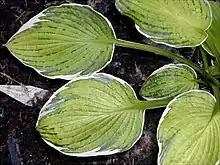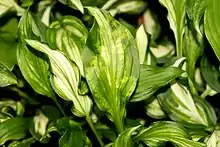Hosta virus X
Hosta virus X (HVX) is a virus that infects Hostas.[1] The disease was first identified in 1996 by plant pathologists at the University of Minnesota, and grouped with the Potato X (potex) viruses.[1] The virus has reached epidemic proportions and can be found in most garden centers and nurseries around the globe.[2]
| Hosta virus X | |
|---|---|
 | |
| Hosta 'Moonlight' cultivar infected with Hosta virus X | |
| Virus classification | |
| (unranked): | Virus |
| Realm: | Riboviria |
| Kingdom: | Orthornavirae |
| Phylum: | Kitrinoviricota |
| Class: | Alsuviricetes |
| Order: | Tymovirales |
| Family: | Alphaflexiviridae |
| Genus: | Potexvirus |
| Species: | Hosta virus X |
Emergence
Hosta virus X began showing up in nurseries in the late 1990s and early 2000s. People bought the infected hostas, believing that they were new cultivars of the plant.[2] Hosta cultivars such as "Break Dance," "Eternal Father," "Leopard Frog," "Blue Freckles," and "Lunacy" were not actual new cultivars, but instead were Hostas infected with Hosta virus X that were mistakenly believed to be new cultivars.[2][3][4][5][6][7] Some of the Hostas infected with the virus were taken to Europe, where they were grown.[2]
Eventually, the virus reached the Hosta wholesale stock in the Netherlands, the Hostas were then sold to other wholesale stocks around the world, and caused the virus to spread quickly.[2]
Signs and symptoms
Hosta virus X does not kill the plants infected, but Hostas that have been infected do show a variety of other symptoms,[8] such as:
- Ink-bleed, which makes the plant look discolored in certain spots, and this effect is generally centered on a vein. An example of this is shown in the photo in this article.[9]
- Desiccation or Collapsed tissue, which can be signs of heavier infection, makes the plant look as if it is dried out.[9]
- Mottling, which makes the plant appear blotchy. This is not always a symptom of HVX, and could be from another virus, but it should always be treated as an infected plant regardless.[9]
A Hosta may no longer express symptoms of the virus when it grows back in the Spring, even though it may have shown symptoms in a previous year. Nonetheless, the plant should still be considered infected with HVX.[10]
A Hosta infected with the virus may be asymptomatic. Some plants in a study conducted by Dr. Ben Lockhart at The University of Minnesota did not show symptoms for up to 3 years after testing positive for the virus.[10]

Control
Once a Hosta plant is infected, it will be infected for the rest of its life. Any plant suspected of being infected should be burned if it is legal to do so. If it is not, then it should be tossed in the garbage, but infected Hosta plants should never be composted. If any plant in a batch shows symptoms, the entire batch should be considered infected and be destroyed. Once a plant has been removed, the spot occupied by the Hosta should be left empty for a long time to prevent the spread of the virus to a plant that replaces it.[11]
The virus primarily spreads through infected sap, so cutting multiple plants with the same tool can spread the virus. Animals that eat the plants may also spread the virus through sap by eating from an infected plant and then eating from an uninfected plant.[8][11]
Hostas with HVX may not show any symptoms for some time after it is infected. People who wish to buy Hostas may request proof from the seller that the Hosta is HVX-free before purchase. After purchase, even if test results come back negative for HVX, the Hosta should be quarantined for several weeks away from other Hostas and be observed to see if it presents any symptoms for HVX.[11]
References
- Baker, Carlye (October 2013). "Hosta Virus X, a Potexvirus" (PDF). Plant Pathology Circular No. 410. Retrieved 2020-05-07 – via Florida Department of Agriculture and Consumer Services Division of Plant Industry.
- "Hosta Virus X - The History of the Epidemic". perennialnursery.com. Retrieved 2020-05-07.
- "Hosta Photo Library". hostalibrary.org. Retrieved 2020-07-20.
- "Hosta Photo Library". hostalibrary.org. Retrieved 2020-07-20.
- "Hosta Photo Library". hostalibrary.org. Retrieved 2020-07-20.
- "Hosta Photo Library". hostalibrary.org. Retrieved 2020-07-20.
- "Hosta Photo Library". hostalibrary.org. Retrieved 2020-07-20.
- "Hosta Virus X". hostalibrary.org. Retrieved 2020-07-22.
- "Hosta Virus X Symptoms". hostalibrary.org. Retrieved 2020-07-22.
- "Hosta Virus Myths | Walters Gardens, Inc". www.waltersgardens.com. Retrieved 2020-12-05.
- "Hosta Virus X". Wisconsin Horticulture. Retrieved 2020-07-22.